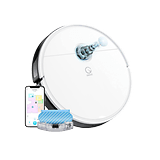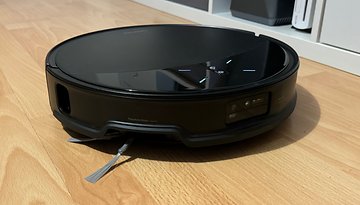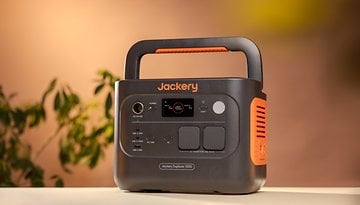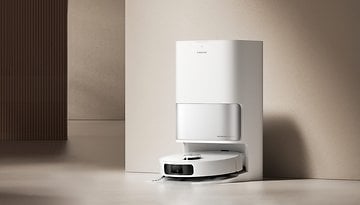Yeedi Vac Max Review: Is it worth buying on Prime Day?
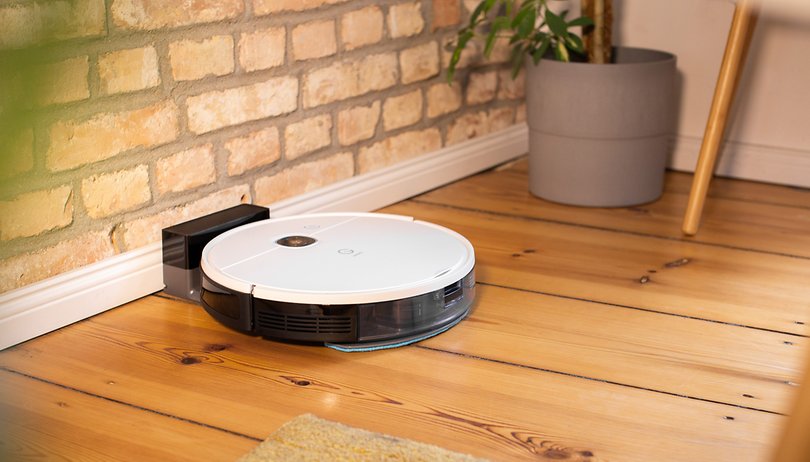

Automating the cleaning of your home shouldn't be an overly expensive endeavor. Today, entry-level robot vacuum cleaners offer advanced options and a more than satisfactory level of cleanliness at a very affordable cost. This is the case with the Yeedi Vac Max, a robot vacuum cleaner that also features a mopping function. Check out the Yeedi Vac Max test and find out if this robot vacuum cleaner meets your needs.
-
Also read: How to choose the best robot vacuum cleaner
Good
- Small footprint
- Quick installation and setup
- Features 2-1 cleaning function
- Super affordable price
- Application with advanced options
Bad
- Incompetent mapping system
- Cannot dodge cables and objects on the ground
- Constant random bumping
- Average mopping capability
- Has a camera
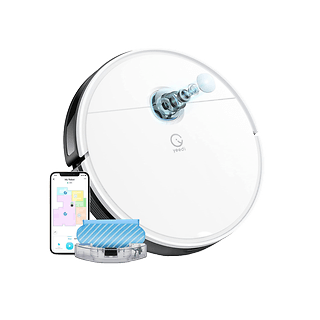
Yeedi Vac Max in a nutshell
[Disclaimer: This article was collaboratively written with Yeedi. It had no bearing or influence on the final rating and editorial content.]
The Yeedi Vac Max is an entry-level vacuum cleaner with advanced features such as different suction and mopping modes, cleaning schedule, and even room cleaning by area. This version is compact in every way, both in the items that come in the box and in the space it takes up at home.
In our tests, Yeedi Vac Max was approved with results above 90% for vacuuming. The mopping function can be considered average, with some inconsistencies when cleaning the house. In addition, the app is really simple to use and the robot's Wi-Fi connection uses the 2.4 GHz or mixed 2.4/5 GHz standard.
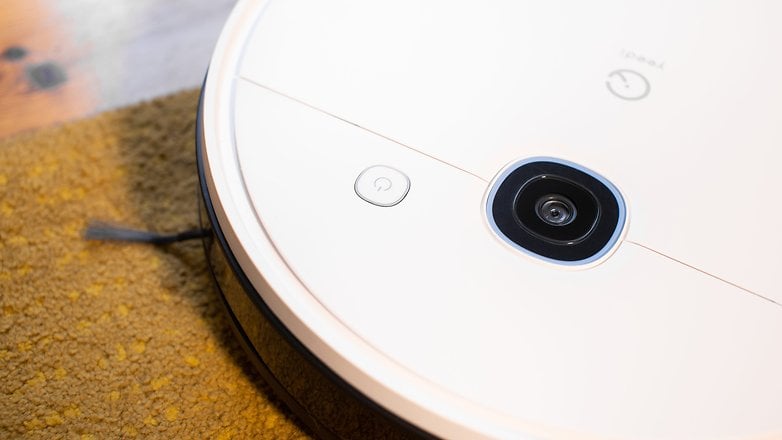
However, mapping and navigation features are the weak point of this smart device. In a small environment, mapping occurs fluidly and navigation is not problematic. Even so, setting up a complete map of the house can be frustrating at times.
The Yeedi Vac Max was released in June 2021 for a starting price of $369.99 and can be found today for $299.99. But that value can get even lower, because during the weeks leading up to Amazon Prime Day, Yeedi is offering a super discount of $60 on Amazon. By applying the discount coupon, the Yeedi Vac Max can be purchased for $239.99.
The Yeedi Vac Max is also compatible with Yeedi self-cleaning station. We could not test both products at the same time, but we suggest using these products together if you want a little more comfort. During the Prime Day(s), you can purchase Yeedi Vac Station for only $199.00.
Yeedi Amazon Prime Day early event
Yeedi has created an early event between June 20 and July 20 during to celebrate Amazon Prime Day in a big way. As a result, Yeedi products are available at a super discount during this period. Check out some of the offers!
Unboxing and setup
The first thing to know is that it is really easy to install the Yeedi Vac Max and start using it. The dimensions of the model can be considered the industry standard, and this model can clean under furniture at 7.7 cm from the floor. Which is really convenient when compared to intermediate models like the Roborock Q7 Max+, for example.
What I liked:
- Compact and discreet.
- Simple installation.
- The quick start guide is very complete.
Disliked:
- Construction of the first map is frustrating.
- Use of camera to measure space.
In the box, we have the charging base, power cord, robot vacuum and mops for cleaning-the Yeedi ships the standard reusable cloth and some disposable options. Because it features 2-1 cleaning, in addition to the dust bin, the Vac Max has a water tank for mopping. In the box, Yeedi sends a thorough and easy to understand quick start guide.
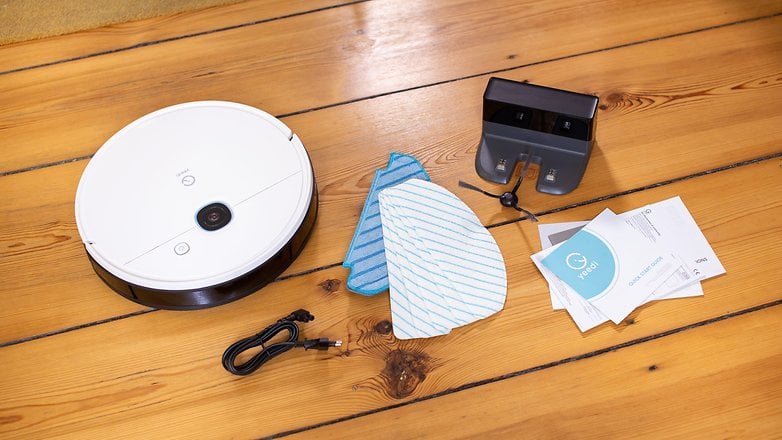
This is not the first Yeedi model I have used—we tested the Yeedi 2 Hybrid and used the robot for a few months—so the installation and first set up was really easy. However, even those who have never set up a robot vacuum cleaner will recognize how easy it is to set up and configure the internet network for use of this device. The important thing is to keep the charging base stable and provide the robot with room to maneuver.
To control the Yeedi Vac Max you will need to download the Yeedi app on your cell phone or tablet (Android or iOS). From there, just make an account and follow the instructions. As the robot has a camera located on the top for space measurement, the addition of the model happens via QR code using the camera lens.
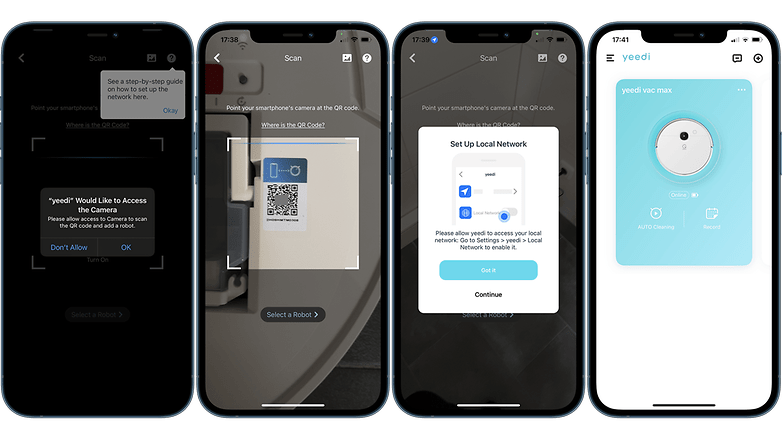
The major difficulty encountered during the unboxing and setup of the robot may be related to the connection to the 2.4GHz network. Before purchasing any smart vacuum cleaner, be sure that your modem relies on 2.4GHz wireless transmission for internet coverage for a larger area. This selection can sometimes sacrifice internet speed, so I recommend using the mixed 2.4/5 GHz standard.
With the Yeedi Vac Max mounted and configured to the internet, it is possible to create the first maps and already start the automated cleaning. For this, it is extremely important to remove any obstacles from the path, such as shoes, cables, and books. It is also recommended to keep the doors of the rooms open and, very important, to let the robot return to the loading dock by itself. Once the first map has been created, the set up phase is complete.
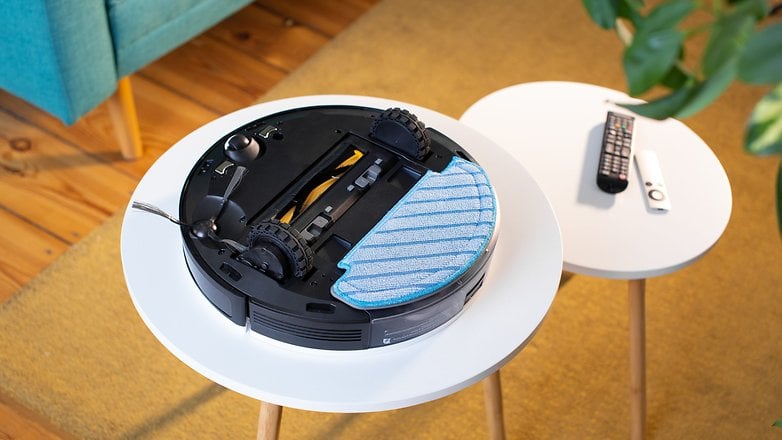
Suction and wiping performance in test
With a suction power of 3000 Pa and 200 minutes Runtime in Standard mode, the Yeedi Vac Max stands out among the cheap models on the market. Here, we also have an edge brush for dirt collection and a main brush that assists in suction. Among the sensors, we have a camera for mapping on top, bumper and collision sensors on the front, and drop detection and carpet sensors on the bottom. For an entry model, the Vac Max is quite complete.
What I liked:
- Cleaning efficiency above 90%.
- Easy to use application.
- Allows you to schedule cleaning.
- Allows you to sign areas and do localized cleaning.
Disliked:
- It has a built-in camera.
- Constant random bumping.
- Average mopping function.
- High battery consumption in Max+ mode.
- Cannot split areas.
Visual SLAM mapping system
Before moving on to cleaning performance and efficiency, I need to highlight the mapping system of the Yeedi Vac Max, as this was one of the most frustrating points during the robot review.
Instead of infrared sensors like we have in more expensive models like the Roborock Q7 Max+, the Vac Max uses a Simultaneous Localization and Mapping (SLAM) system for mapping, and for this it has a camera built into the top to measure the layout of the house. With this, the robot basically maps its surroundings in relation to its own location for navigation purposes.
The problem here is that creating a complete map of the house was not an easy task during the Vac Max test, and unfortunately some rooms were missed. Therefore the recognition of the rooms did not work smoothly, especially the recognition of open and closed doors, and this makes the cleaning schedule a problem at times. It will take patience and dedication to put together a reliable map of your home.
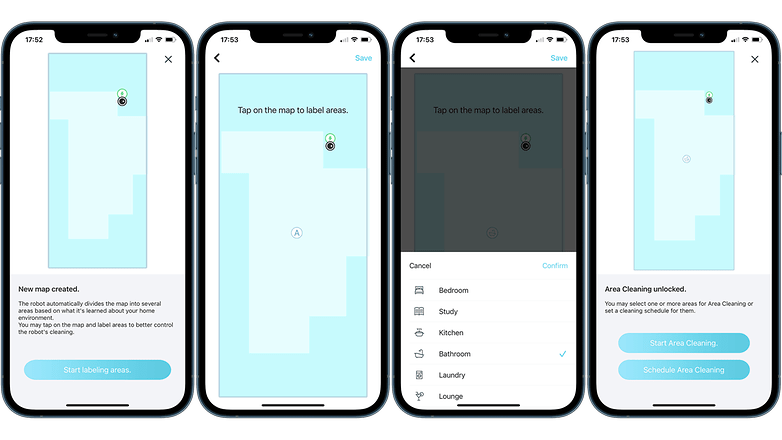
More than this, since the camera is positioned on the top of Yeedi's robot, it does not serve to recognize obstacles such as cables, books, or shoes in front of the robot. Honestly, I consider this a negative point in a model that has a camera built in, since this would be the only relevant point to have a camera in a robot vacuum cleaner.
Cleaning efficiency
As mentioned above, the suction power of the Yeedi Vac Max is 3,000 Pa, however, it is worth remembering that only when the device is using the Max+ advanced cleaning mode. That is, if you use the Standard or Max mode you will be using suction power of 600 Pa and 1,500 Pa, respectively. This also leads to an increase in the noise emitted by the robot.
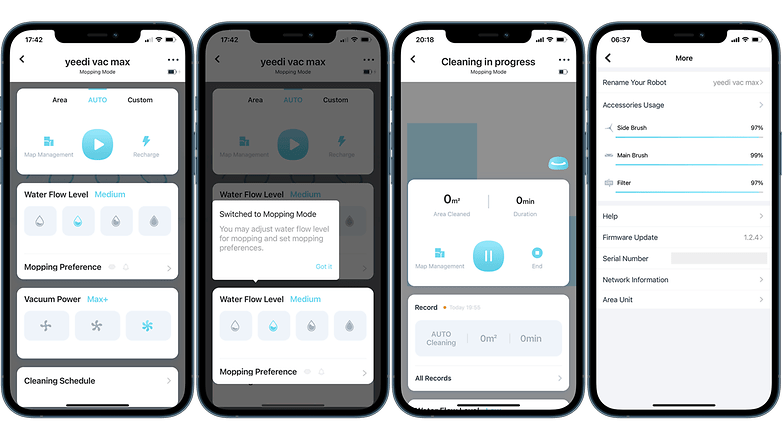
Here you also need to consider that this setting will directly impact battery consumption. The company claims that the Yeedi Vac Max has 200 minutes of Runtime, but this is based on standard suction and not advanced suction. I used the device set to Max+ mode most of the time and the battery consumption is significantly higher.
In this regard, however, the 5,200 mAh capacity battery is an excellent addition to this model. For a full charge it takes approximately 6.5 hours, which is not really a problem given that the device spends much of its time in the charging dock.
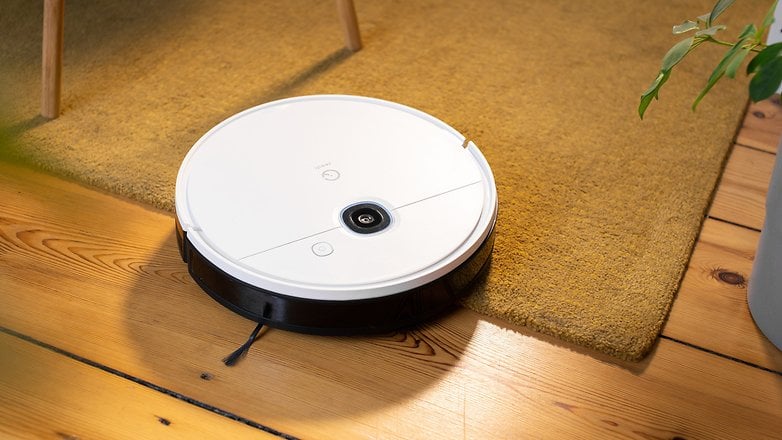
With this in mind, as part of our standard robot vacuum cleaner testing system, we conducted a hands-on test using four types of dirt commonly found in the home. Here the vacuum was set to Max+ mode, and it is worth mentioning that our test scale is accurate to 0.1g. The results are shown in the table below and were performed on a tiled floor:
| Test volume (g) | Suction volume (g) | Efficiency (%) | |
|---|---|---|---|
| Rice |
|
|
|
| Oats |
|
|
|
| Coffee |
|
|
|
| Sand |
|
|
|
As I always mention in my robot vacuum cleaner reviews, in tests carried out in my apartment, where the floor is made of PVC, the results were similar or better than the ones in the table above. Especially when associated with the use of the mopping feature.
Still on the cleaning efficiency, when the areas are well mapped, the cleaning is done regularly and we can create sequences. However, this Yeedi robot frequently bumps into furniture, openings, and baseboards, to the point that the front part where the bumper and collision sensors are located shows marks. In fact, the cleaning of this area needs to be done regularly.
As for the mopping feature, as I describe in most reviews it is only average, but not suitable for heavy cleaning. It works very well for removing dust that has remained on the floor after vacuuming and ensures that "thorough cleaning feeling". Even with the water flow rate is adjustable in four modes, it is only complementary.
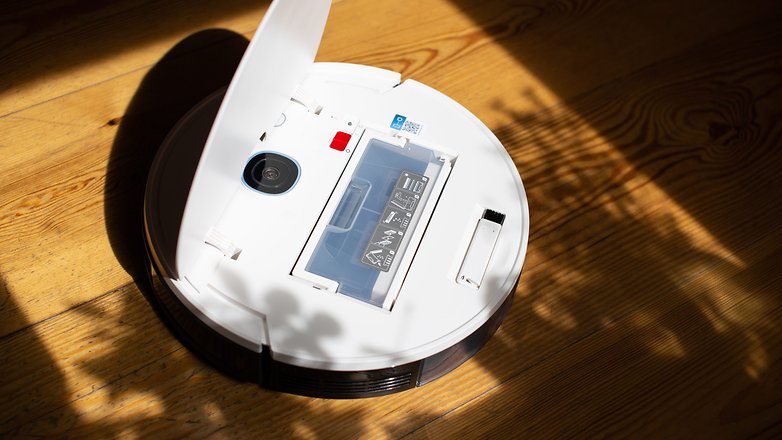
A range of advanced options
Finally, Yeedi Vac Max's companion app acts as the robot's control hub and allows you to select cleaning areas and modes, as well as schedule and automate cleaning processes. Via the app, we are able to track the wear and tear of the brushes, filters, and sensors. By the way, the maintenance of a robot vacuum cleaner is directly linked to the cleaning efficiency.
- Cleanliness matters: Our Top 5 robot vacuum tips for shiny floors
From the app, however, it is not possible to divide rooms, only to make edits such as naming and blocking areas of up to 60 cm to be avoided. The maps cannot be edited either, so if you want to make changes you will have to remap the room.
In addition to control via the app, the robot has an operational button on the top, with which you can wake the robot vacuum cleaner, start and pause cleaning, and turn it off.
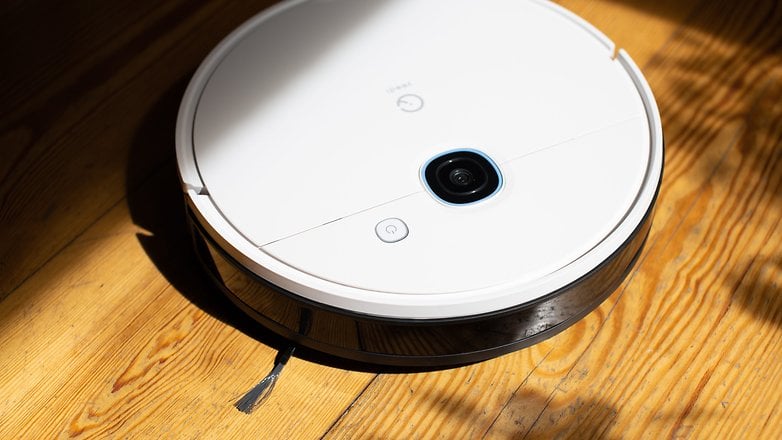
For this test, the firmware of the Yeedi Vac Max was at version 1.2.4. Also, I have been testing the robot for about three weeks now and have not yet been able to connect to Google and Amazon virtual assistants, even though the device features compatibility for Alexa and Google Assistant.
Yeedi Vac Max technical specifications
| Technical specifications | |
|---|---|
| Product | Yeedi Vac Max |
| Picture | 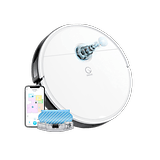 |
| Colors |
|
| Weight |
|
| Overall height (aka "Space under the sofa") |
|
| Max. Suction power |
|
| Loudness (manufacturer's specification) |
|
| Capacity |
|
| Brush |
|
| Cleaning levels |
|
| Battery |
|
| Navigation |
|
| Smart Integration |
|
| Self-emptying feature |
|
| Price |
|
| Offers |
Is Yeedi Vac Max good?
To answer whether the Yeedi Vac Max is any good, you need to consider this model's category, price, and cleaning options. Considering that this entry-level robot vacuum cleaner currently costs less than $250, has suction power of intermediate devices, above-average battery life, mopping feature, and a pretty decent app, the answer is yes.
However, when you consider that the mapping system offers basic options and is sometimes problematic to the point of preventing the cleaning schedule, the answer is no.
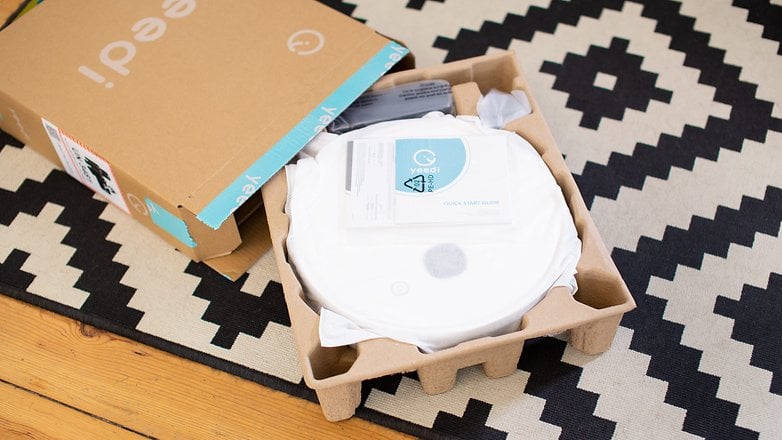
So, if you have a budget of $250 and are considering purchasing the Yeedi Vac Max, my suggestion is to evaluate how much time you would like to spend on setting up your robot vacuum cleaner accurately, as this model from Yeedi has not proven to be that efficient in the mapping field. However, the cleaning efficiency proved to be very good in our tests and the software options are relatively good for an entry category device.
Now, if your budget allows you to invest twice the amount or more, I suggest buying models with a superior mapping system and preferably using the LiDAR method of map construction instead of camera sensors, for example.
